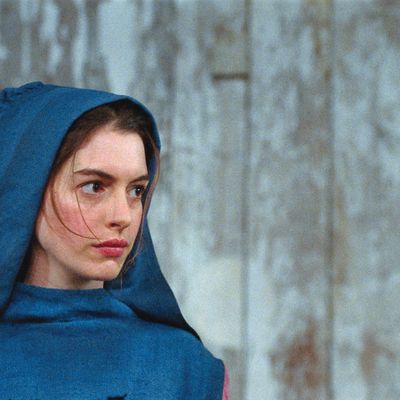
For the musical Les Misérables, director Tom Hooper has his cast of stars perform the songs live on-camera instead of having them lip-synch to prerecorded tracks, which is the norm. He doesn’t want you to forget the momentousness of his grand design, either. When an actor begins to sing, the camera rushes in and fastens on the performer’s face, positioning itself just below the head, somewhere between the navel and the Adam’s apple—and canted from 30 to 45 degrees, although the angle changes as the performer moves and the operator scampers to keep up. I imagined the cameraman to be small, fleet, and extremely high strung, like Gollum. The actors must have had to cultivate an inner stillness to keep from recoiling from him/it. A Zen forbearance would also have kept them from grimacing at all their missed notes.
The tasteless bombardment that is Les Misérables would, under most circumstances, send audiences screaming from the theater, but the film is going to be a monster hit and award winner, and not entirely unjustly. After 30 or so of its 157 minutes, you build up a tolerance for those it’s-alive-alive-alive! close-ups and begin to admire the gumption—along with the novelty of being worked over by such a big, shameless Broadway musical without having to pay Broadway prices. The authors (there are four credited screenwriters) have pared down Victor Hugo’s great wallow of a novel to its dumb, pious moral (Christian forgiveness always wins, though you might not live to break out the Champagne), but the show has been audience-tested for decades and defiantly holds the screen, much like its French revolutionaries at the barricades.
Hugo’s hero, Jean Valjean, is played by Hugh Jackman, who is shockingly emaciated in his first scenes as a prisoner—I mistook him for Ron Moody’s Fagin. Jackman is, of course, an old hand at musicals and looks great when allowed to grow his Wolverine sideburns. He can play Valjean’s unwavering goodness without being a simp. But he’d have come off better if he hadn’t been forced to sing at the tippy-top of his register—and higher. On the other hand, no transposition would have helped Russell Crowe as the lawman Javert, Valjean’s unyielding antagonist: His voice is tight and comes from the head, the sound of a foghorn ending in a wheeze. But he stands and delivers his numbers—I can’t believe I’m using this adverb—manfully, and I salute him. It can’t have been easy for an untrained singer to handle Claude-Michel Schönberg’s awful recitativo, which does not—unlike Schönberg’s near namesake, Schoenberg—have the excuse of being purposefully atonal. “And I’m Javert / Do not forget my name!” would have crumpled a lesser man on the spot.
That music has its adherents, but I must cast my lot with the late Nora Ephron, who resisted Susan Boyle’s thunderous debut on Britain’s Got Talent singing the show’s most famous song, “I Dreamed a Dream”: “That song is worse than all of Andrew Lloyd Webber, and it’s worse than ‘It’s a Small World After All.’ [It’s] the all-time most horrible song ever in history, and the reason is simple: It sticks in your brain and never stops playing … And just when you think it’s gone, you see the title in print, and it starts playing again.” Here, it comes at you via Anne Hathaway after her character, the unwed mother Fantine, is persecuted (“You play a virgin in the light / But need no urgin’ in the night”), shorn of her locks, and raped. She does it in a single take in a ghoulishly tight close-up, and although her plucked-chicken appearance is frightful, I was filled with admiration when she hit the big notes and stole the song back from Boyle. I even joined in the applause. Hathaway will win many awards for this performance, if for no other reason than the image of her giant mouth will imprint itself indelibly on millions of brains, some belonging to Oscar voters.
Another problem with that camera is that it films every actor—heroic, villainous, beautiful, ugly—from the same vantage, which I’d chalk up to the democratic spirit of Les Misérables if I thought Hooper knew what he was doing. He loves his actors to death. Amid the large cast, Sacha Baron Cohen and Helena Bonham-Carter as the scoundrel comic-relief types buttonhole the camera before it can buttonhole them, Samantha Barks makes an agreeably plaintive Éponine, and Eddie Redmayne has a surprisingly strong tenor as the lovelorn revolutionary Marius. Little blonde Isabelle Allen has a sweet voice as Fantine’s little daughter, Cosette, but there’s something not so attractive going on in the top notes of her older incarnation (Amanda Seyfried). Seyfried put over Abba’s “Honey Honey” in Mamma Mia!, but mamma mia, is this pseudo-operatic soprano part hard on a natural alto.
If you don’t know Les Misérables and are thinking of taking young kids, you should be aware that in addition to the rape, a lot of characters expire of consumption or old age and many more get shot full of holes. But the whole cast—the living and the dead—are back on the barricades for the closing anthem. The actors appear visibly relieved to have gotten through it and not to have to do it again eight times a week. Or perhaps it’s because for the first time all evening, they’re not being charged by a rampaging camera. They can be joyously martyrific.
*This article originally appeared in the December 17, 2012 issue of New York Magazine.





